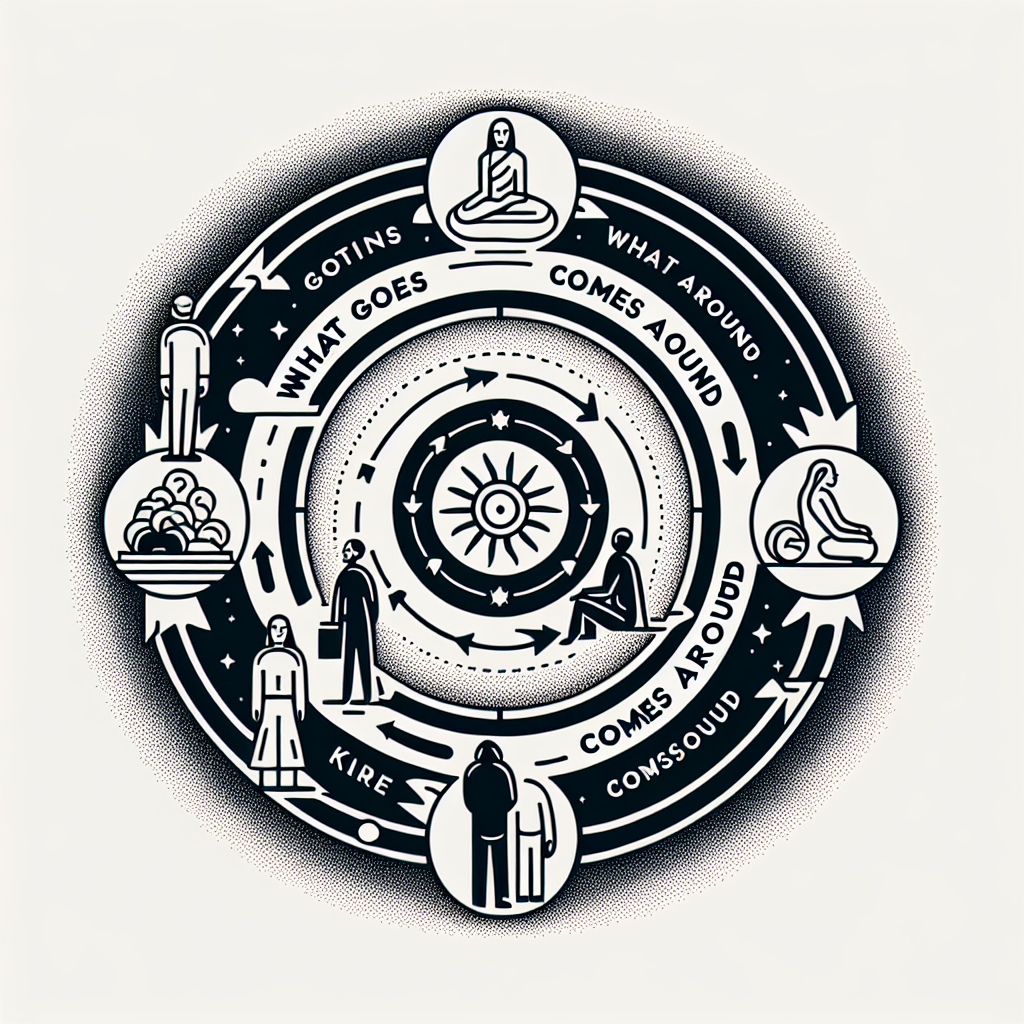Karma is a concept rooted in ancient philosophies, primarily found in Hinduism and Buddhism. It refers to the law of moral causation, implying that every action has consequences that will affect the individual in the present or future. The phrase “what goes around comes around” concisely encapsulates the essence of karma: the idea that the energy you send out into the world—whether positive or negative—will eventually return to you. In exploring the fundamentals of karma, we delve into its definitions, implications, and how it can guide ethical decision-making in everyday life.
Understanding Karma
Karma Defined
The term “karma” comes from the Sanskrit word “karman,” which means “action” or “deed.” In a broad sense, karma refers to the actions that individuals take in their lives and the resulting effects those actions have on their future. Karma transcends mere fate; it is an active force that shapes our experiences through our choices.
The Three Types of Karma
In the philosophy of karma, there are generally three classifications:
- Sanchita Karma: This is the accumulated karma from past actions. It comprises all the effects of deeds from previous lives that have yet to manifest.
- Prarabdha Karma: This is the portion of sanchita karma that is ripe for experiencing in the current life. It represents the events and situations you are currently facing as a consequence of previous actions.
- Agarbha Karma: This is the karma that is being created in the present moment and will impact the future. Every action we take now generates future consequences.
Karmic Cycle
Karma operates within a cyclical nature, often referred to as the karmic cycle. This cycle consists of actions (karma) leading to consequences (the fruits of karma), which in turn influences future actions, creating a continuous loop. The implications are profound; by understanding this cycle, individuals can make more conscious choices that align with their values and mitigate negative consequences.
The Role of Intention
The Power of Intention
Intention plays a pivotal role in the concept of karma. It’s not merely the actions themselves that determine karmic results but the motive behind those actions. For instance, an action performed with a selfless intent might yield positive karma, while a seemingly benign action done with selfish motives can lead to adverse effects. Thus, cultivating positive intentions can contribute to a more favorable karmic outcome.
Positive vs. Negative Actions
Actions can generally be categorized as positive, negative, or neutral:
- Positive Actions: Acts of kindness, compassion, and generosity that uplift others tend to generate positive karma.
- Negative Actions: Actions that cause harm, deceit, or suffering to others typically result in negative karma.
- Neutral Actions: Acts that don’t significantly impact others may not carry strong karmic consequences but still contribute to the individual’s overall karmic balance.
Karma and Reincarnation
The Connection Between Karma and Rebirth
Karma is intrinsically linked with the concept of reincarnation. Many belief systems posit that the karmic debts incurred in one lifetime influence the circumstances one encounters in subsequent lives. A soul’s journey can be viewed as a series of experiences and lessons shaped by past actions. This connection implies that individuals can work on their karma throughout multiple lifetimes, providing ongoing opportunities for growth and redemption.
Karmic Lessons
Many people believe that specific life challenges arise as karmic lessons. For example, an individual who has previously acted selfishly may find themselves in situations that require selflessness, helping them to learn and evolve. This perspective emphasizes the importance of personal growth and accountability in the karmic journey.
Karma in Everyday Life
Applying Karma to Daily Decision-Making
Understanding karma can lead to more mindful living. By recognizing the potential consequences of our actions, we can steer our choices toward areas that promote positivity, compassion, and integrity. This awareness encourages individuals to consider how their behavior affects not only themselves but those around them.
The Ripple Effect
Every action can have a ripple effect. A single act of kindness may inspire others to pay it forward, creating a chain reaction of goodwill. Conversely, negative actions can also create a cycle of harm. By consciously choosing to act positively, one can contribute to a larger collective good.
Common Myths About Karma
Debunking Misconceptions
Several myths surround the concept of karma, which can lead to misunderstandings. Addressing these misconceptions can provide clarity:
- Karma is Punitive: Karma is not a punishment meted out by a higher power but rather a natural law of cause and effect. It reflects the outcomes of one’s actions without judgment.
- Karma Works Instantly: Many believe that karma operates immediately, but often, the consequences of actions manifest over time and may not be visible in the present moment.
- Only Bad Actions Result in Bad Karma: While negative actions do create negative karma, neutral or thoughtless actions can also lead to unforeseen consequences that need to be considered.
Cultivating Positive Karma
Mindfulness and Reflection
To cultivate positive karma, individuals can practice mindfulness and self-reflection. Being aware of one’s thoughts, actions, and their motives provides opportunities for growth and change. Reflecting on daily actions allows individuals to align with their values and make amends where necessary.
Acts of Kindness
Engaging in acts of kindness helps create positive karma. These can range from simple gestures, such as helping a stranger, to more extensive efforts, like volunteering for a cause. The positive energy generated by such actions often reverberates back to the giver in unexpected ways.
Forgiveness
Forgiveness is crucial in the context of karma. Holding onto anger or resentment can create negative karmic baggage. By forgiving others and oneself, individuals can release the ties to past actions, establishing a pathway for healing and positive future actions.
Conclusion
In summary, the basis of karma revolves around the understanding that our actions—no matter how small—have consequences that reverberate through time and space. By recognizing the connection between our choices and their outcomes, we become empowered to shape our destinies positively. Karma is both a law of nature and a moral compass, guiding us toward compassionate living. As we navigate our lives, let us recall that what we send out into the world, be it kindness or negativity, often makes its way back to us in some form. Ultimately, the pursuit of positive karma is not merely about seeking rewards in this life or the next but embracing a way of being that enriches ourselves and those around us.
FAQs
https://open.ai/2dd73193c3452310b4688226514fd3ca , Of course! What kind of prompt are you looking for? It could be a creative writing prompt, a question to stimulate discussion, or something else entirely. Let me know your preferences!, #Basics #Karma, #Basics #Karma, 1734011083, the-basics-of-karma-what-goes-around-comes-around




